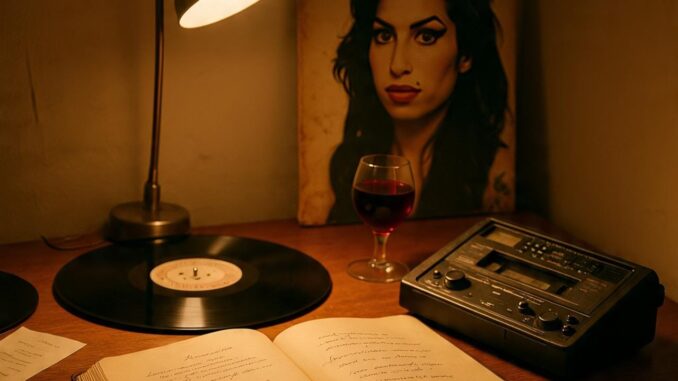
There are artists who live in the spotlight, and then there are artists like Amy Winehouse—who carried a world of pain and poetry just beyond the camera’s reach. With her signature eyeliner, towering beehive, and once-in-a-generation voice, Amy didn’t just sing songs—she exposed her soul. But what if we told you that the most personal pieces of her story were never released to the public? Until now.
In the years following her tragic passing in 2011, whispers of Amy’s hidden diaries, unreleased voice notes, and secret handwritten lyrics have swirled through the music industry. Tucked away in storage lockers, guarded by close friends and family, these fragments reveal a woman far more complex than tabloids ever portrayed. What they contain isn’t just music or memories—they’re confessions. Raw, brutally honest, and heartbreakingly poetic.According to insiders, Amy kept journals filled with sketches, thoughts, poems, and lyrics written in the margins of everyday life. Many of these pages reflect her struggle with addiction, her tempestuous love life, and the suffocating weight of fame. One diary entry simply reads, “Why does love feel like war and peace at the same time?” A line that could have easily become a hit song had she lived long enough to record it.Perhaps most intriguing are the private voicemails she left for herself—using her phone as a late-night therapist. In these intimate audio notes, Amy talks to herself in moments of sobriety and relapse, often reciting impromptu lyrics or reflecting on regrets. One chilling voicemail reportedly ends with her whispering, “Maybe I’m not meant to be fixed.” It’s the kind of vulnerability that pierces deeper than any melody.Also discovered were lyrics to unreleased songs—some scribbled on napkins, receipts, or tucked inside old notebooks. A few are heartbreak ballads. Others are fierce declarations of independence. And then there are those that reveal her longing for motherhood, something few fans ever knew she dreamed of. “If I had a daughter,” one line reads, “I’d teach her to sing before she speaks, and cry only when it matters.”Many of these works were kept hidden, not because Amy was ashamed—but because she wasn’t ready. Those closest to her say she feared being misunderstood even more than being criticized. She knew the media fed on her pain, and so she chose to protect the most fragile parts of her soul from exploitation. In doing so, she preserved the essence of her truth—unfiltered and untouched by PR machines.Now, as calls for a respectful posthumous release grow louder, her estate faces a moral dilemma: Should these personal materials be shared with the world, or kept in sacred silence? Fans are desperate to hear more, to understand Amy not just as a performer, but as a person. But the decision must walk a tightrope between tribute and invasion.Several music producers and biographers are reportedly lobbying to create a documentary-style album or special, incorporating her lost lyrics with instrumental tributes and interviews with those who knew her best. If done right, it could be the most intimate and powerful project ever released in her name. But if mishandled, it could desecrate the very privacy she fought so hard to protect.Amy’s story has always been more than drugs, paparazzi, and fame. It’s about a woman who burned too brightly for the world to hold. These lost diaries and voicemails don’t just humanize her—they immortalize her. They reveal the frightened girl behind the fearless voice. The poet behind the pop star. The truth behind the tragedy.What makes this discovery even more poignant is its timing. A new generation of fans is finding Amy through platforms like TikTok and Spotify. They hear her voice and feel something timeless. These lost writings could give them something even deeper: a mirror into the mind of a genius who never got to finish her masterpiece.If Amy Winehouse’s unheard confessions are ever revealed, they must be treated like sacred artifacts. Not for profit. Not for fame. But for closure—for us, and for her. In the end, she may have hidden these pieces of herself from the world not out of fear, but out of love—for music, for truth, and for the right to tell her story when she was ready.And perhaps now, finally, the world is ready to listen.

Leave a Reply